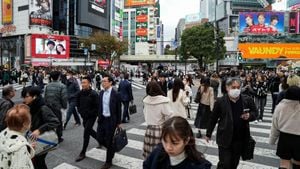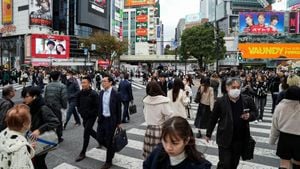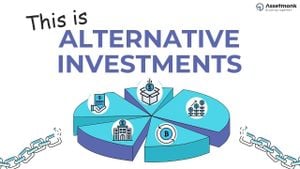The Israel-Gaza conflict has spiraled to unprecedented heights, pushing the humanitarian situation to the brink of catastrophe. Amidst the backdrop of warfare, displacements, and mounting casualties, international bodies and human rights organizations are voicing grave concerns. The impact of the current crisis is not just immediate, affecting civilians trapped in violence, but it could also dictate the future stability of the region.
Recent reports from Human Rights Watch highlight what they describe as systemic and intentional forced displacements of Gazans, likening these actions to ethnic cleansing. The allegations come as evidence suggests civilians have been inadvertently killed during evacuations under Israeli orders and even within humanitarian zones designated by the Israeli government.
Sharon Gaffney of Human Rights Watch elaborated on the findings, underscoring the tragic consequences of collapsing infrastructure which has reportedly displaced many Palestinians permanently. She stated, "The demolitions and destruction seen throughout Gaza make it painfully clear—the very right to live safely at home has been snatched away. The international community must take swift action against such violations." Israel, on the other hand, has dismissed these findings, labeling them as "completely false" and disconnected from reality.
At the heart of the current humanitarian crisis is the role of the United Nations Relief and Works Agency for Palestine Refugees (UNRWA). Philippe Lazzarini, the Commissioner-General of UNRWA, has raised alarms about the potential collapse of their operations due to new Israeli legislation, which would effectively ban the agency from functioning within the country starting January 2025. This legislation's impact could be catastrophic, with Lazzarini asserting, "An entire generation will be denied the right to education if UNRWA ceases to operate here. The education and future of more than 660,000 children are at stake."
UNRWA has been providing desperately needed aid, education, and health services to millions of Palestinians since its establishment in 1949. The stakes are particularly high now, as discussions surrounding funding and international support continue. The role of the United States, historically regarded as Israel's ally, has come under scrutiny as they face pressure to act. U.S. Ambassador to the U.N. Linda Thomas-Greenfield referred to UNRWA's presence as “indispensable,” urging Israel for immediate pause on the legislation before incoming President Trump takes office, who has shown inclination toward policies favoring Israel over Palestinian rights.
The conflict has additional global ramifications. Following the recent escalation originating from the October 7 attacks by Hamas, tensions have risen not only within the Middle East but have also permeated other regions. The U.S. and other nations have begun conversations on potential diplomatic engagements, with Iran recently postponing its planned attacks against Israel to explore negotiations under the anticipated Trump administration.
But the discourse around displacement is multifaceted, involving various political bodies, including associations of humanitarian aid groups and governments. It’s clear, voices like Lazzarini’s are calling for immediate action not just at the individual country level, but collectively worldwide. He notes the connection between education and future instability, stating, "An uneducated population is fertile ground for extremism. Without education, the seeds of marginalization can only sprout, leading to wider consequences for the region and beyond."
The grim reality on the ground is mirrored by the statistics surrounding displacement. Over the past weeks, thousands of families have been forced to flee their homes—conflict-weary and bereft—all seeking shelter from relentless bombings. Reports indicate widespread destruction across northern Gaza, marking this crisis as one of the gravest instances of displacement recorded.
Meanwhile, the spiraling refugee crisis doesn’t end with those currently displaced. The fallout from this current situation casts shadows over the future: affected children today are the future leaders, workers, and communities of tomorrow. With public spaces destroyed and access to basic amenities severely limited, dire predictions anticipate potential famine looming over the enclave. Experts insist immediate humanitarian interventions are required, warning, "The international community cannot afford to wait, or we risk witnessing generational despair. Immediate action translates to potential lives saved and futures protected."
Regional dynamics are expected to shift as world leaders grapple with these crises. Dialogue has begun between the U.S. and Lebanese officials emphasizing diplomatic avenues to de-escalate tensions, with U.S. Ambassador Lisa Johnson submitting proposals for cease-fire agreements amid continued fighting with Hezbollah.
Political leaders across various countries, including Indonesia and Saudi Arabia, have openly condemned the current situation. Recent meetings between Indonesian President Prabowo Subianto and U.S. President Joe Biden signify the importance countries place on supporting Palestine amid the chaos. Backed by collective international pressure, the hope remains for reinstated dialogues leading to long-term peaceful resolutions.
Aside from military strategies, humanitarian efforts, on both personal and governmental levels, must not remain sidelined. The global community appears on the eve of mobilization, with collective calls underscoring universal human rights borne from crises like these. This conflict, more than just military engagements, is echoing warnings of humanitarian exigencies demanding full acknowledgment and decisive, unified actions.
Even with the pervasive darkness stemming from the conflict, the world watches—fingers crossed for peace, and advocacy echoing louder, emphasizing the importance of shared humanity and the urgent necessity for comprehensive support. Each voice uniting as more than just compassionate spectator, but as part of the movement demanding justice, compassion, and restoration.



